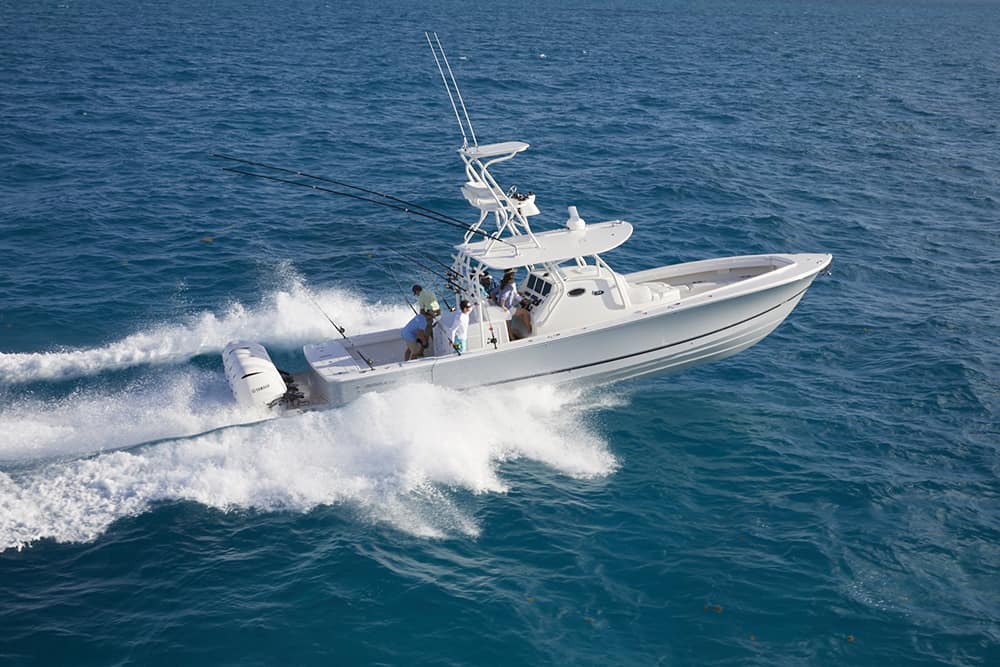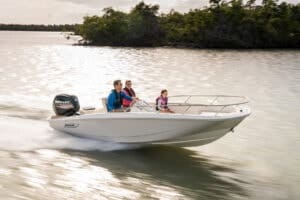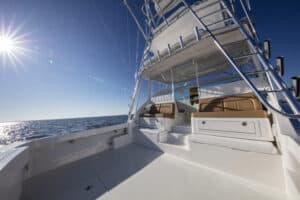How Boat Loans Work
A boat loan is a type of installment loan product, where your lender pays for your boat purchase upfront with a lump sum loan. This is offered with the agreement that you will repay this debt over time through a series of monthly payments. When you’re ready to start the boat buying process, learn how we do boat loans at Trident Funding.
If you choose a fixed-rate boat loan, you’ll have a set monthly payment amount for a predetermined period of time, called your repayment term. If you opt for a variable-rate loan, your monthly payment requirement can change from one month to the next, but you’ll still be expected to make a payment each month for the entire loan term.
As the lienholder, your lender will hold the title for your boat until it is completely paid off. Once you’ve satisfied the debt and cleared your owed balance, your lender will close out the loan and sign over the boat’s title to you.
How Car Loans Work
A car loan is also an installment loan, similar to a boat loan. Once approved, your auto lender will cover the entire cost of your new vehicle’s purchase, upfront and in full. They will retain the title for your vehicle until your loan is repaid as promised. Once you’ve satisfied the entire debt, the title will be released to you and you will no longer have a lien on your car.
As with a boat loan, your car loan will need to be repaid through a series of monthly installments. You’ll make these payments for an agreed period of time, with terms usually ranging between two and seven years. If you take out a fixed rate car loan, your monthly payment will remain the same each and every month. If your auto loan includes a variable rate, the interest portion of each monthly payment can vary.
Boat Loans vs Car Loans: How They Compare
As you can probably tell, boat loans and car loans are alike in many ways. Here are some of the biggest similarities between these two products:
- Both boat loans and auto loans are installment products. With a boat loan or auto loan, a lender pays your seller with an upfront lump sum. You’ll then repay that debt with monthly installments throughout the agreed loan term, plus applicable fees and interest charges.
- Both types of loans are subject to LTV limits. Lenders avoid taking on too much risk by ensuring that the asset you’re buying (in this case, either a boat or a car) isn’t worth less than the price you’re paying. That way, the lender can recoup its costs if you default on the loan. Many lenders have a maximum loan-to-value ratio, called an LTV limit, that they are willing to accept.
- Both could include prepayment penalties. Some lenders may charge prepayment penalties if you pay off your loan ahead of the agreed schedule. While this may save you interest, the added fees could negate your savings, so it’s important to read your loan agreement carefully before proceeding. These penalty fees can be charged by both boat lenders and auto lenders alike.
- You’ll need to meet certain income and credit score requirements. No matter which type of loan you’re hoping to take out, you’ll first need to meet your lender’s eligibility requirements before getting approved. These requirements typically include a minimum FICO credit score (in Trident Funding’s case, this needs to be 680 or higher) and minimum income threshold. You may also need to meet certain debt-to-income ratio (DTI) limits, based on how much you make and how much you owe on existing debt balances.
- There are limits to the type of asset you can purchase. With auto loans, you’re typically limited to purchasing private passenger vehicles. If you want to buy a motorcycle, recreational vehicle (RV), trailer, commercial vehicle, or other type of automobile, however, you may need to take out a different kind of car loan. Similarly, boat loans may only be offered for certain types of boats, depending on the lender you choose. With Trident Funding, for example, you cannot finance liveaboards but you can finance yachts, fishing boats, sailboats, deck boats, pontoon boats, and more.
- You may be limited to purchasing assets of a certain age or condition. Most boat and auto lenders will only offer loans on assets that meet their age and condition requirements. Trident Funding will approve loans for most boats 20 years old or younger, and most lenders will require that the boat be in working condition. Similarly, auto lenders may approve loans for cars 10 years old or younger, as long as they meet condition requirements.
- New, used, and refinance loans may be available. Whether you’re taking out a boat loan or car loan, you are often able to choose between making a new purchase, buying a used car or boat, or even refinancing an existing loan.
Of course, as many similarities as boat loans and car loans have, there are also some important differences. Here’s how they differ:
- Boat loan terms can be notably longer than auto loan terms. While there are some exceptions, the typical auto loan repayment term ranges from 24 months (two years) to 96 months (8 years). Boat loans from Trident Funding, by contrast, can have amortization schedules ranging from 84 months (seven years) to 240 months (20 years) long.
- Loan limits for boat purchases can be much higher than for auto purchases. According to recent data from Edmunds, the average new car purchase was financed for $40,602 in the second quarter of 2022. However, the average boat loan is now disbursed for over $200,000. While you may find auto lenders with higher than normal loan limits, they probably won’t come close to the boat loan limits offered by lenders like Trident — currently ranging from $25,000 all the way up to $2 million.
- You may be able to purchase a boat as a special entity. Very few auto lenders will allow businesses and special entities — such as trusts or LLCs — to purchase and own a vehicle, preferring instead to work with personal borrowers. However, boat lenders like Trident Funding will allow for ownership by private parties, charter companies, trusts, LLCs, and more.
Is It Harder to Get a Boat Loan Than a Car Loan?
So, between the two types of loans, which is easier to obtain and which is more difficult?
Since boat loans are (typically) issued for higher values than car loans, they may have more stringent eligibility requirements than auto loans. This means that you’ll be expected to meet higher income, credit score, and even debt-to-income (DTI) thresholds in order to be approved. If you can’t show evidence that you can afford the larger purchase — depending on how much your new loan will cost you monthly — you are unlikely to be approved. Since cars generally have a smaller purchase price, you won’t need to meet the same financial thresholds.
In a similar vein, it can be harder to get a boat loan simply because you’ll often need to provide a notably larger down payment. While zero down loans are available on some boat purchases, most borrowers will need to put down as much as 10% to 20% for their new boat. If you’re buying a $200,000 boat, this means a down payment of as much as $40,000 (roughly the average cost of a new car). Trident Funding offers zero down boat loans for loans up to $100,000.
It’s also harder to get pre-approved for a boat loan, as you’ll first need to identify a specific boat to get loan approval, in most cases. If you’re still shopping around or aren’t sure of precisely what you want, you might not be able to get your loan pre-approved until you’ve made your selection and are ready to begin the buying process.
With auto loans, on the other hand, you can often get pre-approved for a specific purchase amount, even if you haven’t identified a particular vehicle yet. This allows you to shop around with a particular loan amount and interest rate in mind, so you can jump on the right car when you find it.
The Bottom Line: Boat Loans v Car Loans
Auto loans and boat loans are similar to one another. Both are installment loans that allow you to finance a big purchase and pay off the price over time with monthly payments. You’ll need to meet certain borrowing requirements for each type of loan, and will also need to ensure that the asset you’re buying meets your lender’s criteria regarding LTV, age, and condition.
There are some important differences between boat loans and car loans, namely the repayment terms and loan values available. At the end of the day, though, both types of loans can get you one step closer to the big purchase you’re eyeing. And whenever you’re ready to apply for a boat loan, Trident Funding is ready to help.





